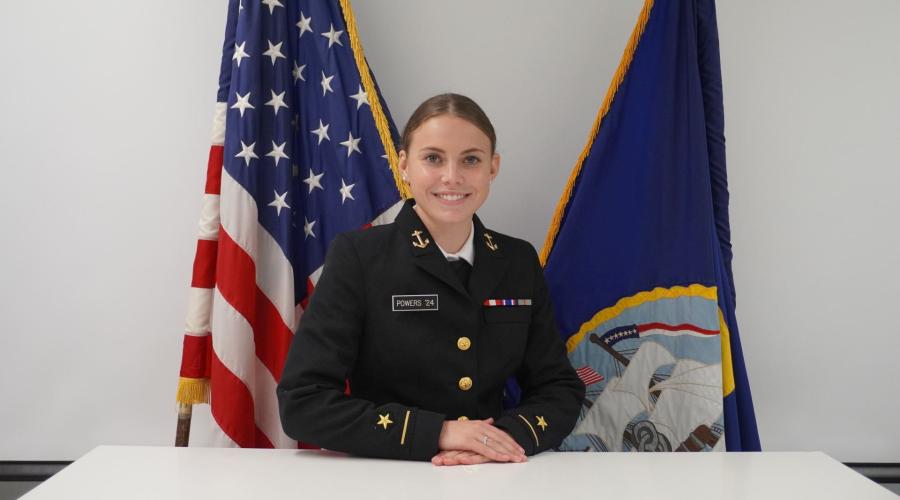
From ILR to a Nuclear Sub
It’s not often that an undergraduate in the Cornell School of Industrial and Labor Relations embarks on a career working on a nuclear submarine, but that is precisely what Carly Powers ’24 will do after graduation this weekend.

Powers, a midshipman in Cornell’s Naval Reserve Officers Training Corps program, will leave on July 9 for Charleston, South Carolina, to attend the Navy Nuclear Power School, widely acknowledged as the most demanding academic program in the U.S. military.
“Being selected for the Navy Nuclear Power School is a significant achievement,” said Captain Scott Hardy, 33rd Commanding Officer & Professor of Naval Science at Cornell University. “It is one of the most difficult assignments to receive due to the academic requirements. Furthermore, Carly’s selection is distinct in that she didn't complete an engineering degree.”
According to Hardy, in addition to being an outstanding student, each applicant is required to complete multiple technical interviews and then sit for a final interview with the four-star admiral who runs the Navy nuclear program.
Powers will spend a year studying how to operate a nuclear reactor. Through the program, she will also learn to be a division officer on a submarine and train to qualify as an officer of the deck.
As a division officer, she will lead a unit of 15 to 30 sailors working in a specific submarine area, such as the reactor, navigation or engineering departments. Typically, 15 officers and 120 enlisted sailors are aboard a submarine, and each officer takes a turn being the officer of the deck for an eight-hour shift.
“As the officer of the deck, also called the OOD, you are the main officer in charge of the functioning of the submarine, aside from the captain,” Powers explains. “The OOD stands in the control room and monitors where the submarine is being driven, as well as the functioning of all other systems, such as sonar, navigation or engineering. They are also the ‘on-call’ officer for everything the submarine does during that eight-hour stretch of time.
“So, my two main responsibilities on the submarine will be leading my division and serving as the OOD.”

At the end of her training, she will have the opportunity to rank her preference among the three types of submarines – fast attacks, nuclear ballistic and guided missile – and where she would like to be stationed. However, the Navy will inevitably station her where it needs her most. Once she joins the crew, her deployment can last anywhere from two to seven months, depending on the submarine type.
Raised in Alameda, California, by a military family, Powers was always fascinated by the possibility of a military career. She also valued the range of opportunities available to her in the military. So, when she received her Cornell and ROTC acceptances, she was thrilled.
Powers said she was particularly excited about the opportunity to participate in ROTC while having an ILR background.
“Being an ILRie has provided an incredibly useful perspective for me as I prepare to enter the fleet,” Powers said. “The primary objective of officers in the military is to take care of the enlisted sailors, or soldiers, in their charge. That means aiding in their personal development and ensuring they have everything they need to do the job well and to ensure their welfare and that of their families.
“ILR is all about the relationship between an employer and employee. This is very similar to the officer/enlisted dynamic. ILR emphasizes treating workers with respect and dignity and giving them the power to voice concerns to their employer about aspects of the job that need to change. I hope to bring this point of view to the Navy.
“Though the military won't be unionizing anytime soon, it is crucial that sailors can rely on their officers to look out for them.”
As a member of “NROTC,” as the program is known in the military, Powers takes Navy-specific classes such as "Sea Power and Maritime Affairs," "Principles of Navigation" and "Naval Engineering," attends weekly drills and does an hour of physical training with her squad each week. Altogether, she has devoted roughly 10 hours per week to the program and has her tuition paid in exchange for five years of future service in the Navy.

NROTC also provided her the unique opportunity to participate in an exchange program with the Japan Maritime Self-Defense Force. Referring to it as one of her “favorite NROTC memories,” Powers spent a month in Japan, primarily at the Yokosuka naval base. In addition to spending a week aboard a Japanese amphibious ship and several days at the Japanese Maritime Officer Candidate School, she was also able to travel by bullet train to many cities in the south of Japan.
An economics minor who swims for the Cornell club team and is currently training for a half marathon, Powers said her first two years in the program were very challenging and time-consuming, but over time, it became more manageable.
This year, Powers served as the brigade commander of the Cornell ROTC Tri-Service, an organization that brings together members of Cornell’s Navy, Army and Air Force ROTC branches to plan joint physical training sessions, leadership workshops and the annual Tri-Service Military Ball.
“Carly came to Cornell on an NROTC scholarship, which is very competitive, especially for top-tier schools like Cornell,” Hardy said. “And she finished her senior year as the brigade commanding officer, which is the highest position you can achieve while in ROTC.”
“She is an absolute superstar. She is kind, hardworking, humble and a natural leader who embodies ‘service before self.’ She reflects the best that our country has to offer, and the U.S. Navy and submarine community are very lucky to have her on the team.”


